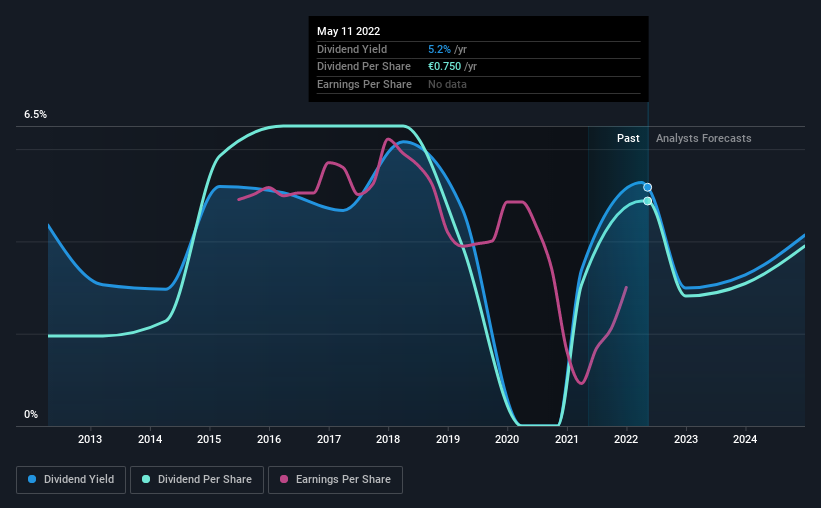CENIT's (ETR:CSH) Upcoming Dividend Will Be Larger Than Last Year's
CENIT Aktiengesellschaft's (ETR:CSH) dividend will be increasing to €0.75 on 25th of May. This will take the annual payment from 5.2% to 5.2% of the stock price, which is above what most companies in the industry pay.
See our latest analysis for CENIT
CENIT Doesn't Earn Enough To Cover Its Payments
Impressive dividend yields are good, but this doesn't matter much if the payments can't be sustained. Prior to this announcement, the company was paying out 148% of what it was earning and 83% of cash flows. While the cash payout ratio isn't necessarily a cause for concern, the company is probably focusing more on returning cash to shareholders than growing the business.
The next 12 months is set to see EPS grow by 32.5%. If the dividend continues on its recent course, the payout ratio in 12 months could be 99%, which is a bit high and could start applying pressure to the balance sheet.

Dividend Volatility
The company has a long dividend track record, but it doesn't look great with cuts in the past. The first annual payment during the last 10 years was €0.30 in 2012, and the most recent fiscal year payment was €0.75. This means that it has been growing its distributions at 9.6% per annum over that time. A reasonable rate of dividend growth is good to see, but we're wary that the dividend history is not as solid as we'd like, having been cut at least once.
The Dividend Has Limited Growth Potential
With a relatively unstable dividend, it's even more important to evaluate if earnings per share is growing, which could point to a growing dividend in the future. CENIT's EPS has fallen by approximately 12% per year during the past five years. This steep decline can indicate that the business is going through a tough time, which could constrain its ability to pay a larger dividend each year in the future. On the bright side, earnings are predicted to gain some ground over the next year, but until this turns into a pattern we wouldn't be feeling too comfortable.
CENIT's Dividend Doesn't Look Sustainable
Overall, we always like to see the dividend being raised, but we don't think CENIT will make a great income stock. The track record isn't great, and the payments are a bit high to be considered sustainable. We would probably look elsewhere for an income investment.
It's important to note that companies having a consistent dividend policy will generate greater investor confidence than those having an erratic one. However, there are other things to consider for investors when analysing stock performance. For example, we've picked out 2 warning signs for CENIT that investors should know about before committing capital to this stock. Looking for more high-yielding dividend ideas? Try our collection of strong dividend payers.
New: AI Stock Screener & Alerts
Our new AI Stock Screener scans the market every day to uncover opportunities.
• Dividend Powerhouses (3%+ Yield)
• Undervalued Small Caps with Insider Buying
• High growth Tech and AI Companies
Or build your own from over 50 metrics.
Have feedback on this article? Concerned about the content? Get in touch with us directly. Alternatively, email editorial-team (at) simplywallst.com.
This article by Simply Wall St is general in nature. We provide commentary based on historical data and analyst forecasts only using an unbiased methodology and our articles are not intended to be financial advice. It does not constitute a recommendation to buy or sell any stock, and does not take account of your objectives, or your financial situation. We aim to bring you long-term focused analysis driven by fundamental data. Note that our analysis may not factor in the latest price-sensitive company announcements or qualitative material. Simply Wall St has no position in any stocks mentioned.
About XTRA:CSH
CENIT
Provides software solutions and associated software consulting and integration services.
Undervalued with moderate growth potential.
Similar Companies
Market Insights
Community Narratives


Recently Updated Narratives

Proximus: The State-Backed Backup Plan with 7% Gross Yield and 15% Currency Upside.

CEO: We are winners in the long term in the AI world

Early mover in a fast growing industry. Likely to experience share price volatility as they scale
Popular Narratives


MicroVision will explode future revenue by 380.37% with a vision towards success


The company that turned a verb into a global necessity and basically runs the modern internet, digital ads, smartphones, maps, and AI.



